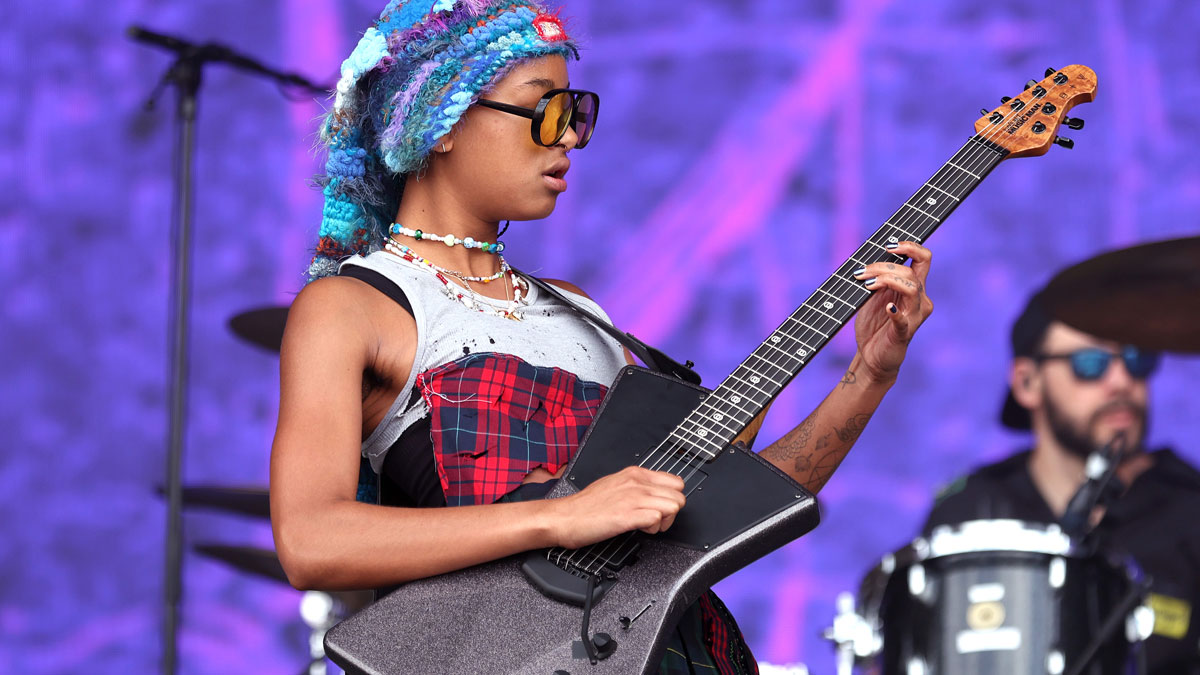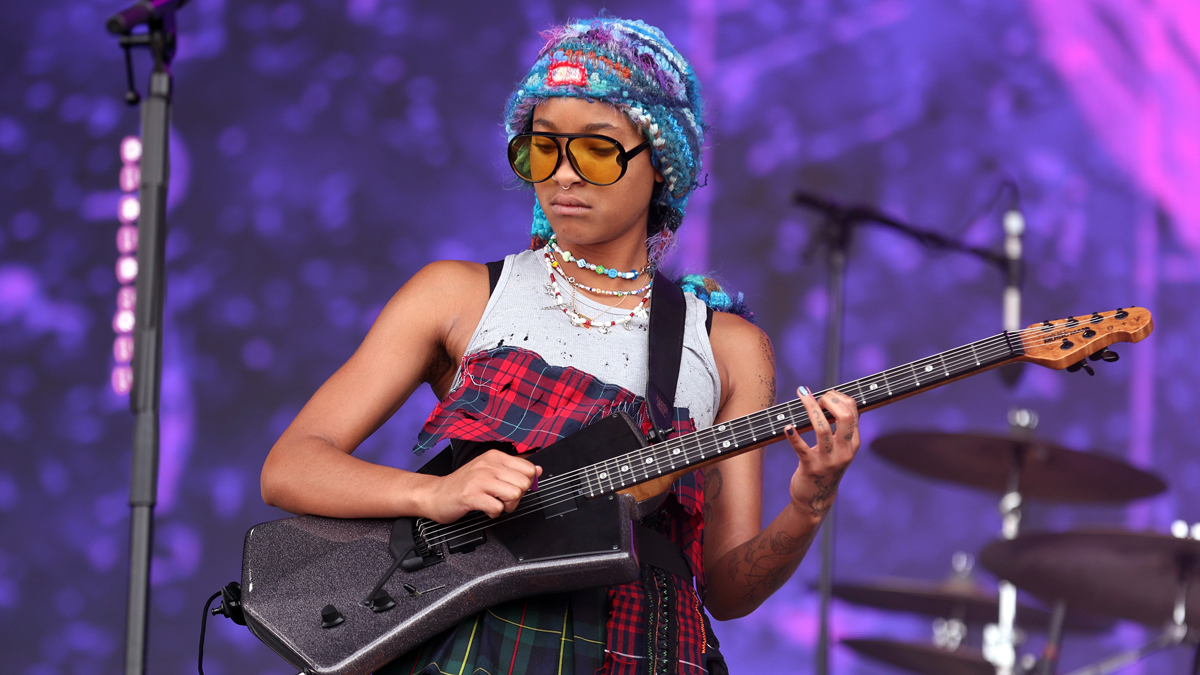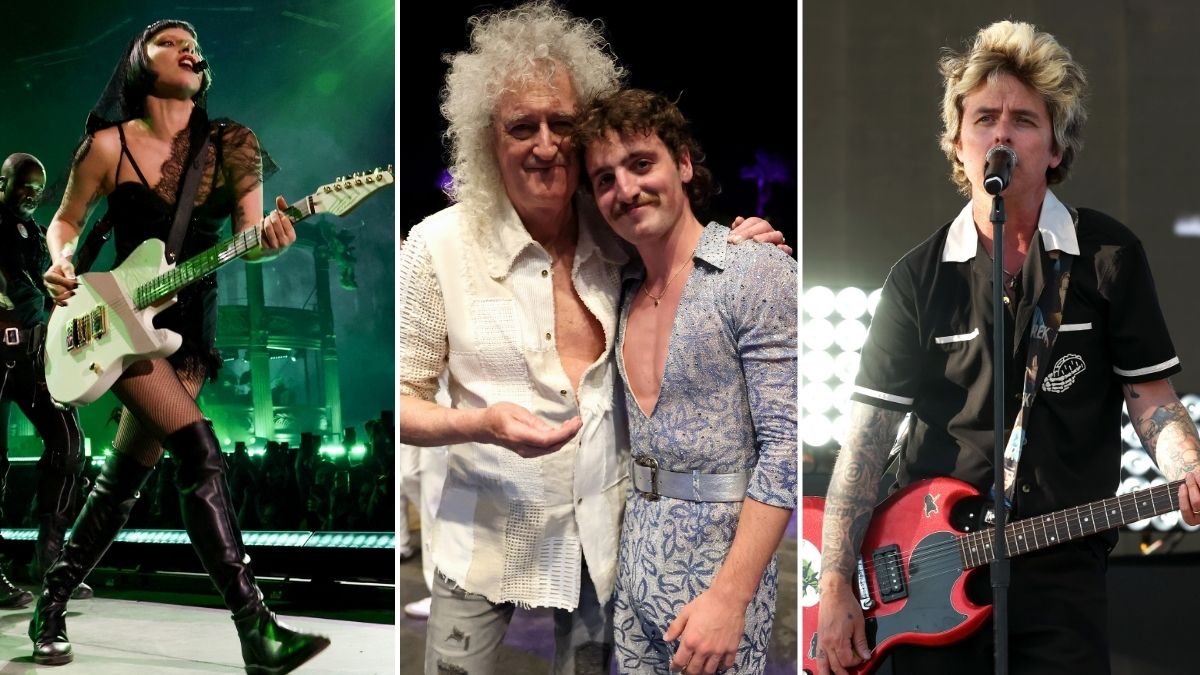Willow on her quest to solo like St. Vincent, getting two-hand tapping lessons from Yvette Young and why her latest album is a love letter to rock music
Following her guitar-heavy creative reinvention, Willow traces her six-string journey so far, her love of heavy music “from Smashing Pumpkins to Lamb of God” and how she hopes to make “women and girls of color feel accepted” in the rock world through her music

She may only be 22 years old, but American singer and guitarist Willow already understands that time is precious. She currently has five albums to her name and there’s plenty of creative wind in her sails to ensure an array of releases could follow in quick succession, if she so desires.
The daughter of Will Smith and Jada Pinkett Smith made her acting debut alongside her father in 2007 post-apocalyptic thriller I Am Legend when she was only seven years old, though in more recent years she’s been focusing on her career as a rock musician – following in the footsteps of her mother Jada, singer of nu-metal band, Wicked Wisdom.
This year’s fifth full-length, Coping Mechanism – which features no less than five singles – is Willow’s strongest and most musically rounded release to date, hard-wiring elements of alternative rock, punk and heavy metal into its own vast and multi-layered being. There are moments that might remind you of Deftones or Metallica, and others more akin to Paramore and My Chemical Romance, but as she explains in this exclusive interview, it’s all 100% Willow.
“I feel that rock is such an expansive genre,” she tells Guitar World, when we connect with her just before the holidays. “People focus on pop-punk a lot. We all love pop-punk, it’s beautiful and amazing. But let’s not forget the metal, thrash and classic rock. There are all these different forms that rock takes and all these different feelings it can express. This album is a love letter to all the flavors rock can have, from Smashing Pumpkins to Lamb of God.”
Given that both of her parents have juggled musical careers alongside high-profile film and television appearances, ranging from Independence Day to The Matrix trilogy, it would be fair to say strong work ethics were encouraged from an early age in the Smith household. If there’s anything she’s learned over the years, it’s how skills need to be continually improved and sharpened – there are no half-measures when it comes to art. What you put out into the world is ultimately what defines you.
“When I was young my parents were, and still are, extremely creative,” explains Willow, when asked what it was like growing up in the same house as two of the world’s most recognizable A-list celebrities. “They’re constantly stretching themselves into new areas and learning new things about their craft. Whether that was acting or writing or playing music, they were always expanding themselves in different directions. I could always see that.
“From a very young age, it was clear to me how they were continually working on their artistic craft and I understood how important that is when it comes to your passions and things you want to do with your life. I guess I was hip to the game from early on.”
Get The Pick Newsletter
All the latest guitar news, interviews, lessons, reviews, deals and more, direct to your inbox!

Take us back to the very start of your guitar journey. When did you decide it would be the instrument for you?
“Throughout my childhood I played the piano. I played guitar a little bit, but the piano was mostly my thing. That fizzled out. After I stopped doing the pop music I was working on at the beginning of my career, I took a detour, so to speak. I took some time to do some digging on what kind of musician I wanted to be.
“It was around the age of 13 or 14 where I felt like I didn’t just want to be a singer-songwriter kind of artist. In order to realize my vision, I needed to be a true musician. To me, that meant learning how to play an instrument and solidifying that into the way I write and perform music. So in my very early teens, that’s when I knew I wanted to pick up the guitar and make that my pride and joy.”
What do you remember about that first guitar?
“My very, very first guitar – and I’m counting from the first one I actually played rather than the guitars from my childhood – was a black Recording King acoustic. Well, I think it was a Recording King, but it was definitely black and acoustic!
“The action was super-high and it hurt like hell [laughs]! I knew that it would help in the long run because I wanted to build calluses and all that jazz. I was really shitty at first, then I started learning simple power chord stuff and it just grew from there.”
Did you ever have formal lessons and tuition in order to progress or was it mainly YouTube?
“I actually didn’t use YouTube much. I’ve only ever had two guitar teachers. The first one was after I’d been playing for about two years already. He was really into classical guitar, so I trained with him for about two years, after the two years of me getting acquainted with the guitar myself.
“We started working on classical stuff with a nylon-string guitar. After that I got with another teacher who was more into the electric guitar, with a classic rock feel. We did an intensive year and a half, close to two years, together. The rest has just been me figuring it out.”
What was the biggest moment for you in terms of learning? Was there a point where you felt everything fell into place?
I remember playing Romanza on guitar the whole way through with no mistakes – I was close to shedding a tear. I felt like, ‘Yes, I’m really doing what I set out to do!’
“There’s a song I learned called Romanza, which is a classical piece. After weeks and weeks of practicing all day long, I remember playing it the whole way through with no mistakes and feeling so excited. Honestly, I was close to shedding a tear. I felt like, ‘Yes, I’m really doing what I set out to do!’
“That made me want to keep going and keep getting better. It was right after I’d done my album The 1st, which I recorded before I had a guitar teacher. I was just playing willy-nilly on that one – I listen back to it and it actually sounds pretty good.
“It’s crazy how intuitive a lot of that stuff sounds looking back now, but at the time I felt like my playing wasn’t that great. I was a bit down on myself about that. So the Romanza moment came after. That’s when I knew the work had really paid off; it’s the moment I knew if I kept going for it, these milestones would happen more and more.”
It’s quite interesting how the role of guitar has evolved over the course of your albums.
“Yeah! For example, The 1st – which was actually my second album – was all orchestral, with a lot of cello, violin, piano and acoustic guitar. It was very different to my other albums. That said, there was a song called Human Leech which had seven-strings and growling. It was actually my mom growling on that song in the background, which is pretty interesting.”
Let’s talk about your favorite gear. We’ve seen footage of you with a Jackson King V, as well as signature models from modern trailblazers like Yvette Young and St. Vincent.
“So with the Ernie Ball Music Man guitar, I have to start by being honest and saying I love St. Vincent. She’s one of my favorite musicians ever. The guitar is super-sleek and light, plus the action is low, which I love. It is very easy to move with and play. I feel like a lot of guitars are a bit harder to dance and move with. The St. Vincent signature is so comfortable in that sense. It’s such an inspiring guitar to play, even more so because I know it’s one she designed. She is one of my idols still to this day.”

How does it differ to the Ibanez YY10 Yvette Young sent you, out of curiosity?
“Yvette has this beautiful way of creating sparkly, ethereal sounds and I feel like her guitar is perfect for doing that. It gives the player this angelic kind of tone, and then there’s the color it comes in. Also, I just love Yvette. She is one of the best guitarists of this generation, if I’m being completely honest.
“It was such an honor to receive this guitar from her. Her two-handed techniques are insane. When I first met her, she tried teaching me how to do a little bit of that tapping. Obviously, I’m not as talented at that as she is, but it stuck a little bit. There are a few riffs I’ve written since which have a good amount of tapping. I’m so grateful for the times we’ve spent together and the things she’s taught me.”
I want women and girls of color to feel accepted and know that rock is for them. They can pick up the guitar, bass, drum sticks or microphone
It’s really inspiring to see you and Yvette – two talented women from minority backgrounds – becoming the modern stars of guitar. Hopefully that will inspire others to start their own musical journeys and create more inclusivity and positivity in rock and metal.
“That’s one of my missions. I want women and girls of color to feel accepted and know that rock is for them. They can pick up the guitar, bass, drum sticks or microphone. I want to hear them scream and sing, putting all of their energy into this beautiful genre and change the world. And yeah, I agree, I feel like it’s changing!”

What was your approach to the tones and progressions we’re hearing on your latest album, Coping Mechanism?
“If we were talking about my Lately I Feel Everything or Willow albums, I could totally get into that with you. Realistically on Coping Mechanism, my good friend and amazing producer Chris Greatti took the reins. With a lot of the chords and changes you hear on this album, I’m not the kind of person who could be [like], ‘This is a C# major flat seven!’ or whatever.
“But when something sounds nice, I know where I want it to go and can take it there. Chris being the expansive guitarist he is, with all of that knowledge, mixed with my discerning ear and knowing exactly what kind of sounds I want to create worked out beautifully. We gave you the masterpiece that is Coping Mechanism.”
What kind of gear do you plug into when you’re jamming at home?
“Actually I just started using a Kemper at home… which is ridiculous, having only just got one. I definitely should have started using one way before. I’ve been performing with a Kemper on the past couple of shows we’ve done, and also at home, I’ve been jamming on that with my Jackson V exclusively…
“I just love that guitar. I think the pickups are just so gnarly and the sound is really heavy. When I think of thrashing on the guitar, that’s the guitar that comes to mind. The sound is just wicked and very abrasive. That’s what I love about the Jackson guitar.”
A post shared by Certified Young Fiery Lass (@willowsmith)
A photo posted by on
That’s the guitar you were using when you briefly covered My Own Summer (Shove It) by Deftones – which has a harmonic minor feel that wouldn’t sound out of place on a Spanish guitar…
“It’s such a clever riff, it’s genius. And I agree 100% about the Spanish thing. I love that chromatic kind of feel. When I’m writing, I try to use some of those chromatic intervals for the dissonance it creates. I’m all about dissonance – that’s my thing!
“I feel like Deftones do a really good job of mixing dissonance with ethereal beauty and harmony. That’s where it’s at for me. Chino [Moreno] is a big influence on me vocally: he’s the best. I also really love Crowbar. Lifesblood For The Downtrodden is one of my favorite metal albums ever.”
You recently uploaded a short cover of the Primus track Follow the Fool, which prompted Les Claypool himself to comment, “Fine guitar pickin’ there young fiery lass”. Nice work!
“Primus are so cool. You don’t have to be radio-friendly to be cool. Radio-friendly is dead! We only want amazing musicians, thought-provoking lyricism and the most hard riffs ever. That’s what sounds cool to me. Radio-friendly… whatever. We just want amazing music.”
A post shared by Certified Young Fiery Lass (@willowsmith)
A photo posted by on
Finally, what’s your next challenge as a player? What kind of style or technique are you hoping to master?
“I want to get better at the art of soling. There are a few moments in my show where I riff intuitively, but I’d love to get better at writing solos and paying more attention to what I’m trying to communicate with those specific notes. I’d also love to get better at tapping. I’m working on that stuff every day.
I keep telling myself if I can play guitar as well as I can sing, then I will be satisfied
“I keep telling myself if I can play guitar as well as I can sing, then I will be satisfied. That’s always in my mind every day when I pick up a guitar. I sing with this reckless abandon and emotional courage; I hope that will translate into my guitar playing. I’ve been doing singing lessons for 12 years now. Every time I pick up a guitar, that is my goal: to get as proficient and efficient on my external instrument as I am with my internal instrument.”
That’s a great way of putting it.
“It’s all about the consecutive steps that become a lifetime of growth. I’m probably going to be doing this until the moment I die and I’m very grateful for that. When it comes to soloing, I’d love to sound more like my favorite two guitarists, Yvette Young and St. Vincent. I just went to see St. Vincent perform – obviously, it was so fantastic. And Yvette kills it every time. Those are two women I really look up to.”
- Coping Mechanism is out now via Roc Nation.
Amit has been writing for titles like Total Guitar, MusicRadar and Guitar World for over a decade and counts Richie Kotzen, Guthrie Govan and Jeff Beck among his primary influences as a guitar player. He's worked for magazines like Kerrang!, Metal Hammer, Classic Rock, Prog, Record Collector, Planet Rock, Rhythm and Bass Player, as well as newspapers like Metro and The Independent, interviewing everyone from Ozzy Osbourne and Lemmy to Slash and Jimmy Page, and once even traded solos with a member of Slayer on a track released internationally. As a session guitarist, he's played alongside members of Judas Priest and Uriah Heep in London ensemble Metalworks, as well as handled lead guitars for legends like Glen Matlock (Sex Pistols, The Faces) and Stu Hamm (Steve Vai, Joe Satriani, G3).
“I was writing songs from eight years old, but once I got a guitar I began to deeply identify with music… building an arsenal of influences”: How Lea Thomas uses guitars her dad built to conjure a magic synthesis of folk, pop and the ethereal
“I liked that they were the underdogs. It was not the mainstream guitar. It was something that was hard to find”: Vox guitars deserve a second look – just ask L.A. Witch’s Sade Sanchez, who’s teaming hers with ugly pedals for nouveau garage rock thrills











